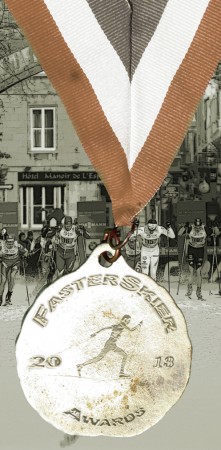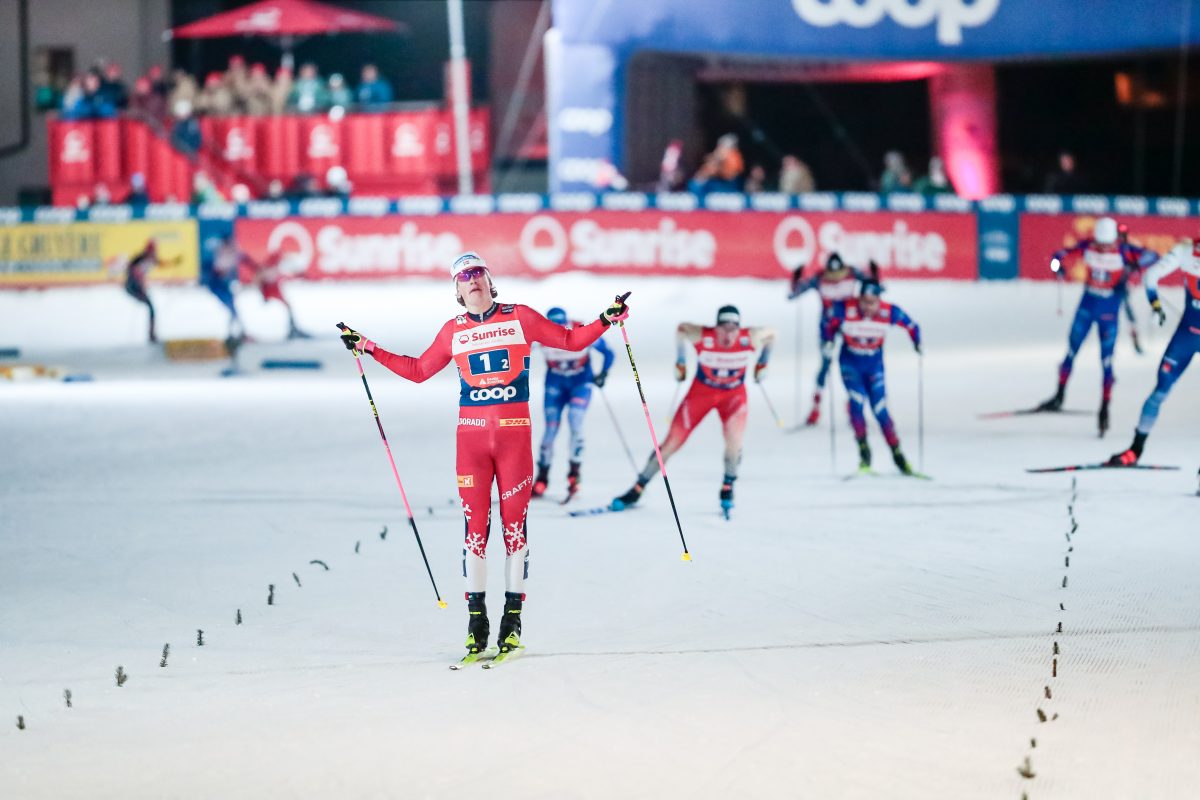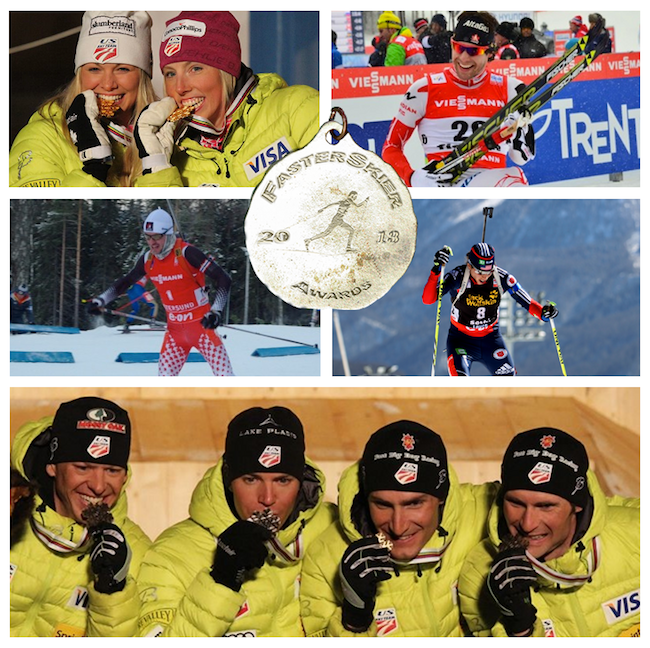
Women’s Cross-Country Performance of the Year: Jessie Diggins and Kikkan Randall (USA), Gold World Championships Team Sprint
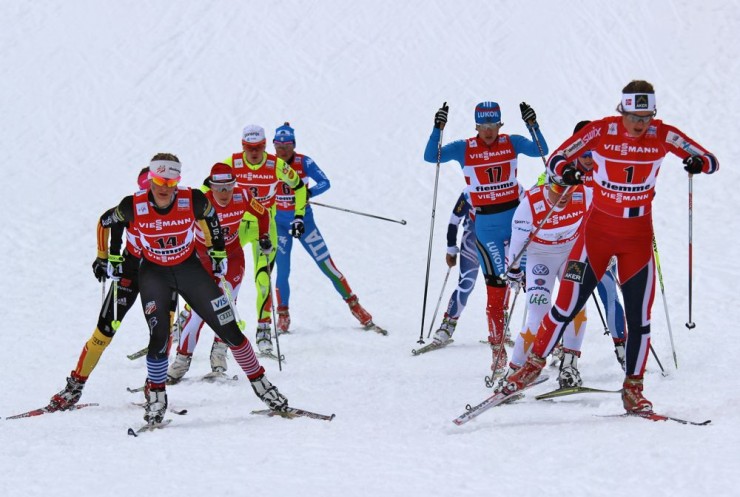
Hands down, the biggest performance of the season came from the American women’s dream team of Kikkan Randall and Jessie Diggins in the freestyle team sprint at World Championships. Nothing matches a gold medal at the biggest event of the year, and that one 20-minute and 24-second race was meaningful for so many reasons, both historical and in the moment.
Yes, it was the first American gold medal in a cross-country at a World Championships. Yes, it fulfilled the promise Diggins and Randall first showed last winter in Milan, Italy. But for those two women, the outcome of that day in February was assurance that the thing they’d each spent a lifetime working towards was possible. And for the entire U.S. team, it turned around what had been a rough start to World Championships and set off a series of more PRs and gutsy performances throughout the rest of the event.
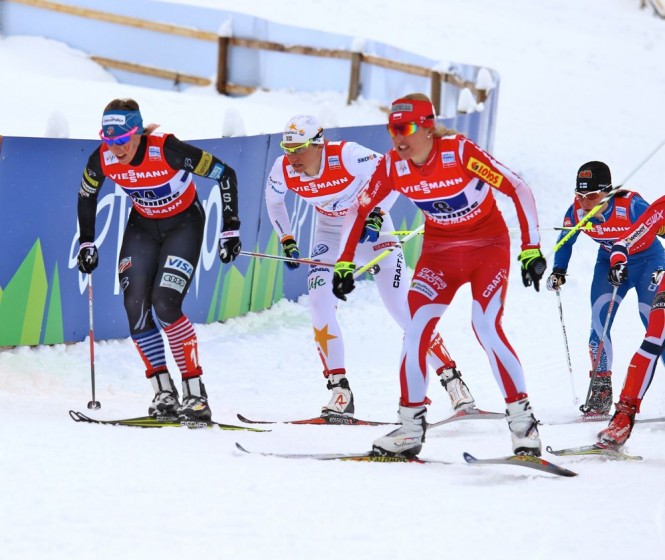
The emotions of the day aside, Diggins and Randall’s combined dominance that day is worth noting. Nothing in sports is guaranteed, but Diggins and Randall were heavy favorites and acted accordingly the entire race. Randall wasn’t in perfect form in Italy, but on that day her sprint prowess showed and she alternately slowed the pack down and accelerated away from it when she wanted to. Diggins demonstrated similar control and confidence in her plan, and in her final leg a lost pole — incredibly — was a non-issue.
The World Championships team sprint would make Randall and Diggins worthy of 2013’s Performance of the Year on its own, but what adds points in the ‘performance’ department was the way they handled their success a month later, when they returned stateside to finish off the season. There was a Fast and Female event in Truckee, Calif., before SuperTour Finals began, and there the duo started a victory tour of sorts with their teammates and a hoard of adoring, pink-clad girls to do what they could to make sure that their gold medal will simply be the first of many for American women’s skiing. These World Champions don’t just sign autographs and keep walking — they take photos, organize clinics and make a lasting impression on the people around them.
Honorable mention:
Though the highlight of the season culminated with the team sprint, there were many performances throughout the winter that are worthy of note. Liz Stephen (USA) finally broke through the top-five barrier in the 10 k freestyle at World Championships. And thought it happened at the very beginning of the season, the U.S. women’s 4 x 5 k relay earned bronze in Gallivare, Sweden, to set the tone for what turned out to be the best winter the U.S. has ever had on the World Cup.
— Audrey Mangan
Men’s Cross-Country Performance of the Year: Alex Harvey (CAN), Bronze World Championship Classic Sprint
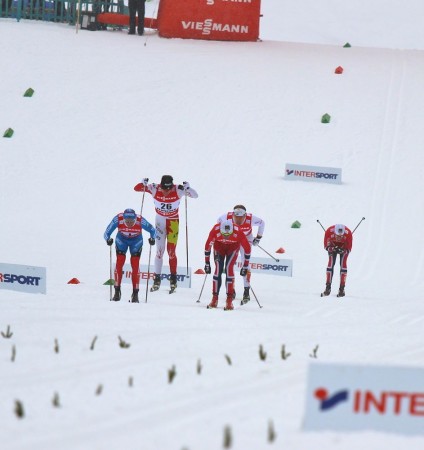
In every season there are plenty of impressive individual performances, and it can be difficult to differentiate between one top-5 and another. But regardless of any objective measures, hardware carries the day and thus Alex Harvey is the well deserving recipient of the men’s Cross-Country Performance of the Year.
While Ivan Babikov had his best all-around season, Lenny Valjas reached the podium and both Dasha Gaiazova and Perianne Jones had breakthrough campaigns, the Canadians were aiming high in 2013 with goals of multiple World Cup podiums and World Championship medals.
Harvey’s bronze medal in the classic sprint at World Championships may not have erased the disappointments of a challenging season for the team, but it drastically changed the tone — no country with the exceptions of Norway, Russia and Sweden can assume medals, and even one is a significant accomplishment for most programs.
While Harvey is not know as a “sprinter” and his medal performance may have shocked some, he has his fair share of short distance results. But in taking down the likes of Emil Jönsson (SWE), Eirik Brandsdal (NOR) and Teodor Peterson (SWE), Harvey has certainly cemented his status among the sprinting elite.
Canada has a grand total of three World Championship medals and Harvey has won two of them, also pairing with Devon Kershaw to take gold in the team sprint in 2011. Given the strength of the Canadian team in recent years, it would not be unreasonable to take Harvey’s bronze for granted, but such medals are a rare occurrence and the competition has never been tougher.
Honorable Mention:
Ivan Babikov (CAN), 4th World Championship 15k Freestyle
Babikov had his best season to date and executed a phenomenal performance in the 15km skate at Worlds, placing fourth behind Petter Northug (NOR), Johan Olsson (SWE) and Tord Asle Gjerdalen (NOR). With the three podium finishers starting within 10 minutes of the Canadian, and back splits showing Babikov off the pace, there was not much drama in terms of a potential podium. The result, however, should not be diminished by that fact and Babikov had one of his biggest races on the grandest stage.
Alex Harvey/Devon Kershaw (CAN), 4th World Championship Team Sprint
By all accounts Kershaw had a rough season, never finding his top form, and limping through to the conclusion. But he dug deep in an attempt to defend the gold in the team sprint, pairing with Harvey for an impressive performance.
Harvey lost out at the line, missing a second bronze by mere inches. There may have been no medal, but coming that close is pretty darn good, especially given the adversity the Canadian squad faced this season.
— Topher Sabot
Men’s Biathlon Performance of the Year
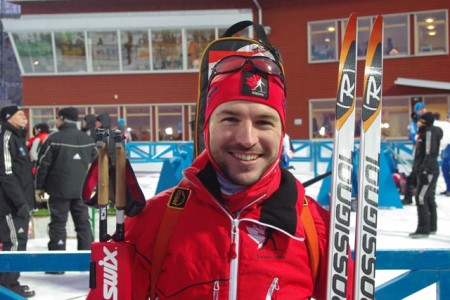
One of the most significant men’s performances was also one of the earliest: it came from Jean Philippe Le Guellec on the first day of December in Ostersund, Sweden. On a windy day, he shot clean to claim an 18-second victory, the first ever by a Canadian man on the World Cup.
It was certainly a huge day for Canada, but the excitement was palpable for North America as a whole; the U.S. and Canada may work extra hard to beat each other in relays, but when one athlete succeeds, particularly in such a historic fashion, the rest cheer him on. It was a reminder that Le Guellec, who had several sub-par seasons thanks to a long recovery from mono, was back; it was also a message that the European teams had better not have forgotten about North America over their summer training seasons, and set up what was to come as Tim Burke landed on the podium in both World Cup and World Championship racing.
Besides becoming the first man to win a World Cup, Le Guellec was the first Canadian to top the podium since Myriam Bedard, a fellow Quebec native and role model for Le Guellec as a young athlete. Besides boosting team morale, the program is hoping that having a win to their name will help get funding and fans, especially with an Olympic season coming up.
Honorable Mentions: Tim Burke (USA) for a silver medal in the 20 k individual at World Championships; Sean Doherty (USA) for becoming the Youth World Champion in the pursuit at his own World Championships.
Women’s Biathlon Performance of the Year
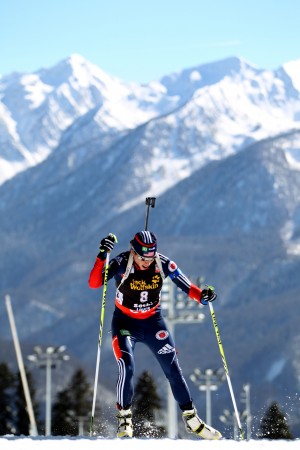
Speaking of that Olympic season, the biathlon circuit traveled to Sochi, Russia, to check out the Games venue for the first time. It was there that Susan Dunklee turned in the best North American performance of the season for the women, placing seventh in the 15 k individual. It was the closest the American has come to repeating her fifth-place finish from World Championships in the same format last year, and the venue gives a clue that Dunklee just may be a big-stage performer for her team.
Honorable mention: Rosanna Crawford (CAN), who had her moment in Pokljuka, Slovenia, where she placed 12th in the sprint. It was a breakout season for Crawford and provided the Canadian women’s team with a much-needed new face near the top of the results sheet as last year’s best performers, Zina Kocher, hit a bit of a slump. Also worth noting: Canada’s Sarah Beaudry, who placed fifth in the youth women’s individual race at World Youth and Junior Championships.
— Chelsea Little
Nordic Combined Performance of the Year: U.S. Men’s Team, Bronze World Championships 4×5 k
The U.S. Nordic Combined Team came into World Championships with a clear-cut goal of least one medal. At the start of the 2012/2013 season, coaches Dave Jarrett and Chris Gilbertson challenged its A-team to three medals in four events. It wasn’t going to be easy, but they took four pieces of hardware at the 2010 Olympics.
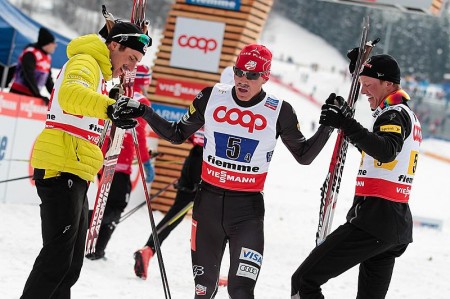
“Whether it’s one individual, one team, we’ll take any combination we can get,” Gilbertson said the day before World Championships started in Val di Fiemme, Italy. “I’d be happy with one [medal] right now the way things have been going.”
The U.S. jumping coach, Gilbertson wasn’t going to sugarcoat it; the season hadn’t gone as planned to that point in February. No one was overlooking 22-year-old Taylor Fletcher’s World Cup career bests of third and fifth in Seefeld, Austria, but the veterans – including Billy Demong and Todd Lodwick – really needed to step up.
Three days later on Feb. 24, Demong, Lodwick, Taylor and his brother Bryan Fletcher rallied to capture bronze in the 4×5-kilometer team event. The World Championships team medal was a first for U.S. (Demong, Lodwick, Johnny Spillane and Brett Camerota combined for silver at the 2010 Olympics) after several near-podiums.
“This is a bit of a monkey off the back in regards to being fourth at World Championships so many times in the team event,” Lodwick said. “I can’t tell you how awesome it was to live in the moment and take it for what it was worth.”
Starting more than a minute back in fifth, Taylor skied a gutsy first leg to bring the team within 10 seconds of the leader. Bryan and Lodwick proceeded to hold their own, and Lodwick tagged to Demong as the anchor in fourth. With two men on his heels, Demong put down a relentless pace for his two laps and finally dropped Japan’s Yusuka Minato and Austria’s Mario Stecher less than half a kilometer before the finish.
“It was really, really amazing to watch these guys ski up so much time and catch the lead and then be in the hunt,” Demong said. “[Being] able to pull off a medal felt like a big success.”
“Bill and I have been here, but it’s nice to have the next generation of skiers come up and step into places that need to be filled,” Lodwick said.
“This is a dream come true,” said Bryan, 26. “I literally came into this World Championships being like, ‘If I could just do this once, it would be amazing.’ I’m ecstatic, I think Taylor’s ecstatic, and everybody else is ecstatic to come away from this with a medal, especially when our team this season has been a little bit shaky, really up and down. I think we’re starting to come into our own.”
— Alex Matthews
2011
XC
Kikkan Randall (USA)
Alex Harvey and Devon Kershaw (CAN)
Biathlon
Sarah Studebaker (USA)
U.S. Men’s Relay Team
Nordic Combined
Todd Lodwick (USA)
2010
XC
Devon Kershaw (CAN)
Kikkan Randall (USA)
Biathlon
Tim Burke (USA)
Zina Kocher (CAN)
NoCo
Billy Demong (USA)
2010
XC
Devon Kershaw (CAN)
Kikkan Randall (USA)
Biathlon
Tim Burke (USA)
Zina Kocher (CAN)
NoCo
Billy Demong (USA)
2009
Kikkan Randall (USA)
Alex Harvey (CAN)
2008
Kikkan Randall (USA)
Andy Newell (USA)

